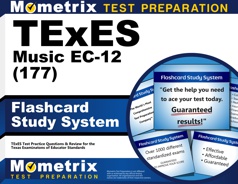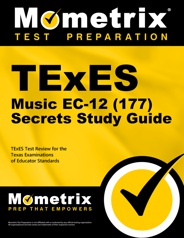The Texas Examinations of Educator Standards (TExES) Music exam was designed to determine participants’ knowledge and aptitude to perform as entry-level music educators in Texas public schools.
The exam is compiled by the Texas Educator Certification Examination Program (TECEP), which provides several similar standardized exams for public school subjects in Texas.
In order to determine the questions on the exam, and therefore the proper qualifications for public school music educators, TExES Music questions are based on ten total music education standards. These include:
- Comprehensive visual and aural knowledge of music performance
- Singing and playing music instruments
- Musical notation
- Creating and arranging music
- Music history
- Evaluating musical compositions and performances
- Implementing effective musical instruction
- Appropriate discipline and management of music classes
- Understanding student assessment
- Professional responsibilities in music instruction
By covering all ten of these musical standards through questions on the TExES Music exam, the TECEP certified those music educators who are best qualified to meet the standards of public school education in the state.
How Should I Get Registered for the TExES Music Exam?
Those interested in taking the TExES Music exam should register on the TECEP website. Test appointments can be made year-round and specific times and dates are assigned on a first-come, first-served basis.
Examinations are administered by Pearson, an international standardized testing administrator. Pearson offers the TExES Music exam at computer-administered test sites throughout Texas and the U.S.
The exam requires a $116 registration fee.
How Is This Music Exam, Provided by TExES, Administered?
The TExES Music exam participants receive a five-hour appointment time. 15 minutes are devoted to a computer-administered test tutorial and four hours and 45 minutes are devoted to testing time.
The exam includes the use of a headset during “listening” questions. Prospective participants can take a tutorial on this feature before the exam by visiting the TECEP website.
What Belongings Are Permitted and Prohibited During the Music Exam from TExES?
Participants in the TExES Music exam are required to bring with them two pieces of original and valid identification printed in the names in which they registered.
The first piece of identification must be government issued, such as a driver’s license, passport or military identification.
The second piece of identification can be any valid and original documentation that bears the participant’s name and a clear photograph or their name and signature.
Participants are forbidden from bringing a long list of items to the exam. Prohibited items include cell phones or other electronic communication devices, handwritten or printed study materials, backpacks or bags of any kind, food or drink and unauthorized medical devices.
Calculators are not permitted during the exam.
What Specific Content Appears on this Music Exam Provided by the Texas Examinations of Educator Standards?
As noted above, the TExES Music exam content is based on ten music education standards. The exam includes 100 selected-response questions, each of which falls into one of five domains. These domains make up different percentages of the exam and each includes a range of competencies. To provide a sense of the specific content that appears on the exam, it is helpful to review a list of the main domains and a few of the competencies they cover:
- Domain One: Listening (25 percent of full exam)
- Applying standard terminology to musical recording
- Understanding music of diverse styles, cultures and genres
- Domain Two: Music Composition and Theory (17 percent of full exam)
- Reading, writing and interpreting musical notation
- Understanding techniques and methods of musical improvisation and composition
- Domain Three: Music Culture and History (17 percent of full exam)
- Understanding the history of Western music
- Knowing how music can demonstrate elements of specific cultures
- Domain Four: Classroom Performance (25 percent of full exam)
- Knowing techniques and methods of singing
- Understanding methods and techniques for playing instruments
- Domain Five: Music Education (17 percent of full exam)
- Planning and implementing effective music instruction
- Providing students with learning experiences that enhance musical appreciation, skills and knowledge
How Can I Be Sure to Pass the TExES Music EC-12 (177)?
Because of the TExES Music exam’s comprehensive inclusion of musical education domains and its emphasis on ten robust standards of musical education, it is critical that prospective participants spend the bulk of their study time familiarizing themselves with this base knowledge. Because the exam also includes a unique listening element, prospective participants will want to leverage customized study tools.
The tailor-made products from Mometrix Test Preparation can put participants in the TExES Music exam in the best possible position to pass. The combination of Mometrix’s study guide and flashcards gives them the chance to both become familiar with the exam’s large base of information and to drill on that information so that they can apply it to exam questions.




